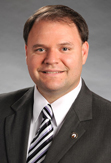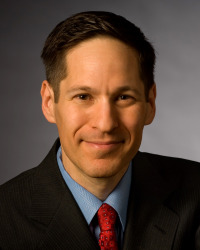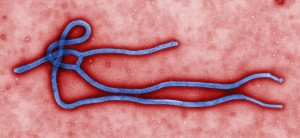The state’s public health agency says it has boosted its outreach efforts to Georgia health workers and hospitals on dealing with the potential of Ebola infection here.
The effort – involving disseminating information and CDC protocols about handling a potential Ebola case – comes amid mounting national concern about the virus, which has led to the recent death of a man in Texas and the infection of a nurse who treated him.
Eight Atlanta hospitals have expressed a willingness to treat a potential Ebola patient here, Dr. Patrick O’Neal, director of health protection for the Department of Public Health, told GHN on Tuesday.
He also said he believes it’s inevitable that a case of Ebola will be diagnosed in Georgia. (Emory University Hospital in Atlanta has already treated cases of Ebola, and in fact was the first U.S. facility ever to do so. But those patients were flown in from the epidemic zone in West Africa and treated in a special isolation ward.)
Public Health says it has communicated its guidelines to all licensed physicians, physician assistants, educators and emergency medical services providers. The agency also is working closely with the Georgia Hospital Association, Public Health Commissioner Dr. Brenda Fitzgerald, told the agency’s board.
The Public Health response to the Ebola crisis also comes as an influential Georgia legislator is urging the agency to be proactive in protecting Georgians from the disease, which has killed more than 4,000 people in West Africa.
State Rep. Jason Spencer (R-Woodbine), who led the legislative charge earlier this year to curtail the Affordable Care Act in Georgia, wrote Fitzgerald a letter dated this past Sunday in which he questioned the response by the state and federal governments in combating Ebola.
Spencer focused on air passengers from West Africa entering the United States through Atlanta’s airport.
“I have not heard of any updates, advisories or precautions issued by the Department of Public Health detailing Georgia’s actions to screen incoming West African flights to isolate potentially high-risk travelers flying into Georgia,’’ wrote Spencer, a physician assistant. “The only advisories I have seen have been from the CDC. Unfortunately, I question the wisdom of the federal government and the Centers for Disease Control and Prevention not to ban incoming flights out of West Africa.”
“Unfortunately, my confidence in the CDC and the U.S. Department of Health and Human Services is very low. I hope our [Public Health] Department is being more proactive.”
Atlanta’s Hartsfield-Jackson International Airport is one of five in the nation that will screen incoming passengers from West Africa for signs of Ebola.
A mixed picture
Fitzgerald, addressing Public Health’s board Tuesday, pointed to the quick response by health officials when a Cobb County inmate told jail officials that he had recently traveled to West Africa and might have Ebola.
(Authorities say they later learned that the inmate had not traveled abroad since 2005, and the man now faces felony counts of making false statements, according to an indictment.)
Fitzgerald said Tuesday that Public Health has been informing the general public that the risk of Ebola infection “is very low.”
Spencer, in an interview with GHN, said that in his job as a physician assistant, he has not yet seen Ebola information from Public Health.
He said he is concerned about the level of preparedness of hospitals and health care workers in Georgia in the event of an Ebola patient coming here.
“Are we being told the right information about how to contain the disease?” he asked.
Spencer said he questions who is in charge of Georgia’s Ebola response, the state or the federally run CDC (which is based in Atlanta). “States need to take the lead on this,’’ Spencer said.
CDC vows more responsiveness
Separately Tuesday, CDC Director Dr. Tom Frieden said federal health officials will rush special Ebola teams to any U.S. hospital that confirms an Ebola case.
Frieden also said officials have thus far failed to determine how Dallas nurse Nina Pham contracted the virus during treatment of Thomas Eric Duncan, who died last week at Texas Health Presbyterian Hospital in Dallas.
USA Today reported that Frieden acknowledged at a news conference Tuesday that more CDC experts should have been sent more quickly to the Dallas hospital after Duncan, who arrived from West Africa in late September, was diagnosed with Ebola.
“We should have put an even larger team on the ground immediately, and we will do that any time there is a confirmed case,” Frieden said.
Two nurses from the specialized biocontainment unit at Atlanta’s Emory University Hospital are in Dallas to review the hospital’s procedures.
If necessary, Frieden said, future Ebola patients could be transferred to one of the four hospitals in the United States with specialized biocontainment units. Two of them – one at Emory and one at Omaha’s Nebraska Medical Center – already have treated Ebola patients.
Pham, 26, issued a brief statement through Texas Health Presbyterian saying she is “doing well” and thanking the medical team providing her care. She is the second medical professional working outside West Africa to be diagnosed with Ebola after treating an infected patient. The first was in Spain earlier this month.
Questions on protective gear
Meanwhile, O’Neal told GHN that he has concerns about the tightly sealed personal protective equipment causing health care workers to become overheated and fatigued. That, in turn, could lead them to make mistakes, he said.
“Proper use of personal protective equipment, when [protocols] are totally adhered to, allows health care workers to care for Ebola [patients] safely,’’ he said.
He said the state agency is being transparent in its communications to the public.
“It’s terribly important to be concerned about Ebola but it’s equally important not to be panicked.”
Georgia law permits DPH to isolate or quarantine individuals if necessary.
Public Health said signs of Ebola include fever or other symptoms, such as severe headache, muscle pain, vomiting, diarrhea, abdominal pain, or unexplained hemorrhage.
Symptoms appear in two to 21 days after exposure, but the average is eight to 10 days. Clinicians, or any other person providing assistance, should ask sick individuals about their recent travels to determine whether they have been in West Africa within the previous three weeks, Public Health said.
Travelers returning to the United States from the affected regions in Africa should monitor their health and body temperature for 21 days after arrival, and report any problems.





